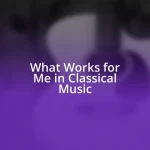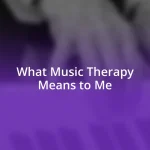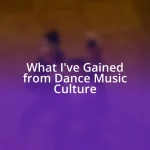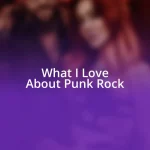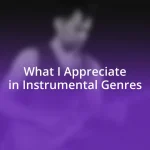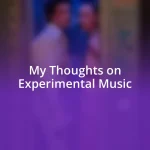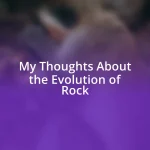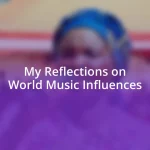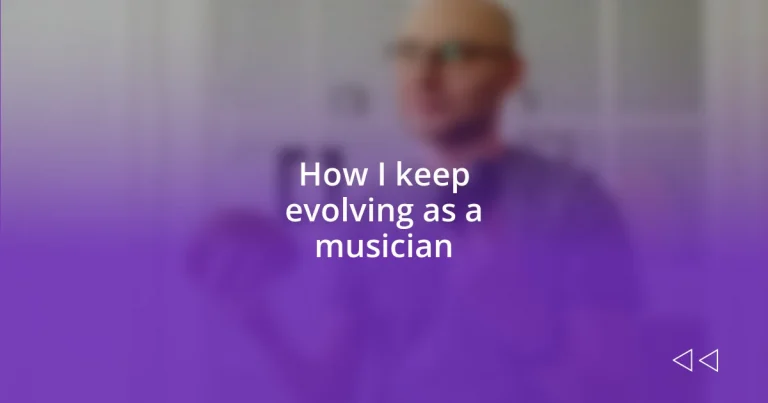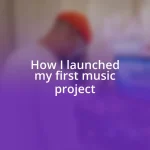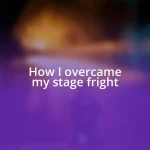Key takeaways:
- Defining musical goals is crucial for direction; focusing on storytelling and connection through lyrics enhances emotional impact.
- Exploring diverse genres fosters creativity and personal growth, enriching both sound and storytelling techniques.
- Collaborating with other musicians and seeking feedback can transform one’s music, promoting skill enhancement and deeper audience connections.
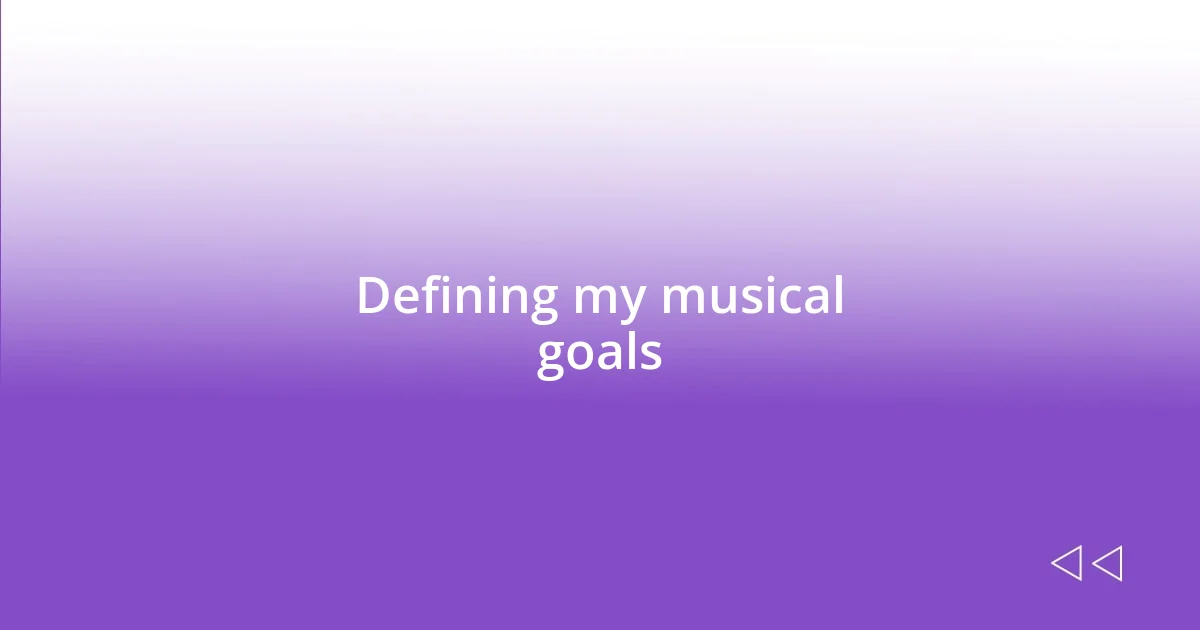
Defining my musical goals
Defining my musical goals has always felt like setting a compass for my journey. I remember a time when I was unsure whether to focus on songwriting or honing my instrument skills. It was during a songwriting challenge that I realized my true passion lies in crafting stories through music, pushing me to place greater importance on my lyrical abilities.
As I reflect on the progression of my musical ambitions, I often ask myself, “What impact do I want my music to have on others?” This question keeps me grounded and focused. I want my songs to evoke emotions and create connections. One memorable performance, where I saw tears in the audience’s eyes as they related to my lyrics, reinforced this goal—making me realize that touching someone’s heart is what drives me forward.
Moreover, I’ve learned that evolving as a musician means setting specific and measurable goals. For instance, I recently aimed to complete an EP— a mix of personal and collaborative tracks. Not only did this challenge me to push my creative boundaries, but it also taught me the invaluable lesson of collaboration, revealing how blending different influences can elevate my work to new heights.
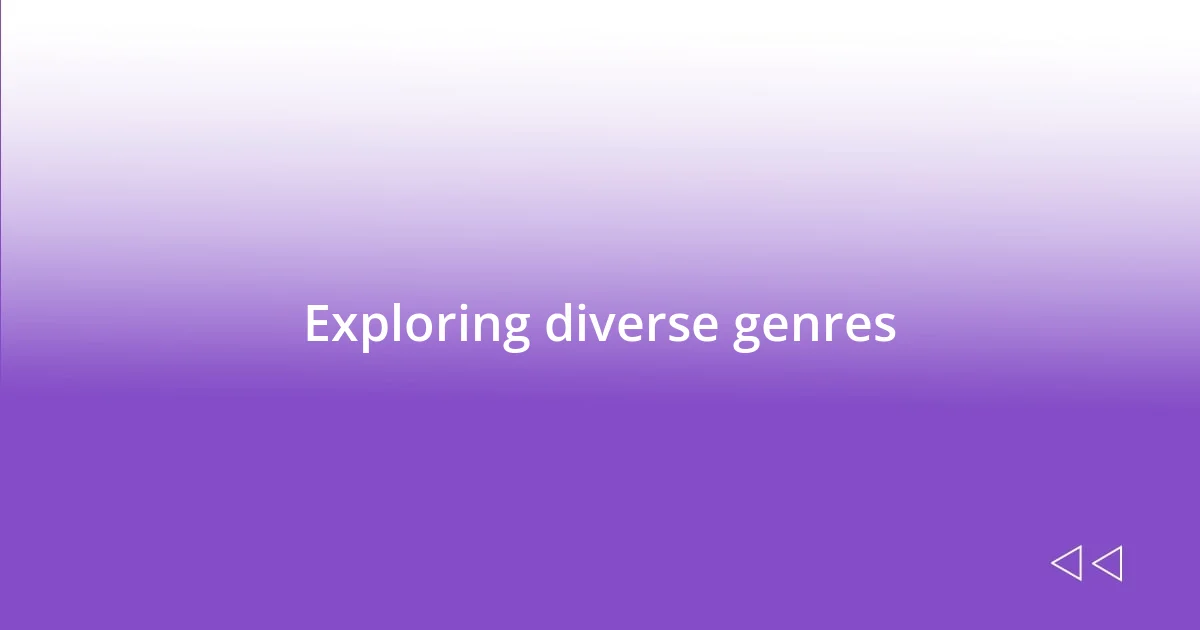
Exploring diverse genres
Exploring diverse genres has become a pivotal part of my musical journey. I vividly recall the first time I dove into jazz, a genre so rich in improvisation and emotion. Sitting in a smoky café, feeling the energy of the live band, I realized how jazz liberated my creativity, inspiring me to experiment with unexpected chord progressions and rhythms in my own songwriting.
As I ventured further into different genres like folk and electronic music, each style taught me something unique about sound and storytelling. I remember attending a folk festival where I was captivated by the simplicity and sincerity of the lyrics. The experience pushed me to incorporate more intimate narratives into my own music, enriching my connection with the audience. It’s fascinating how each genre adds a new layer, expanding not just my musical palette but also my identity as an artist.
I sometimes find myself asking, “How can I blend these influences while staying true to myself?” This question fuels my artistic growth. I’ve even embarked on collaboration projects where I fused acoustic elements with electronic beats. These sessions opened my eyes to the beauty of versatility and taught me that embracing diverse genres isn’t just about exploration—it’s about evolution as a musician.
| Genre | Emotional Insight |
|---|---|
| Jazz | Fostering creativity through improvisation |
| Folk | Connecting with intimate storytelling |
| Electronic | Exploring versatility in sound |
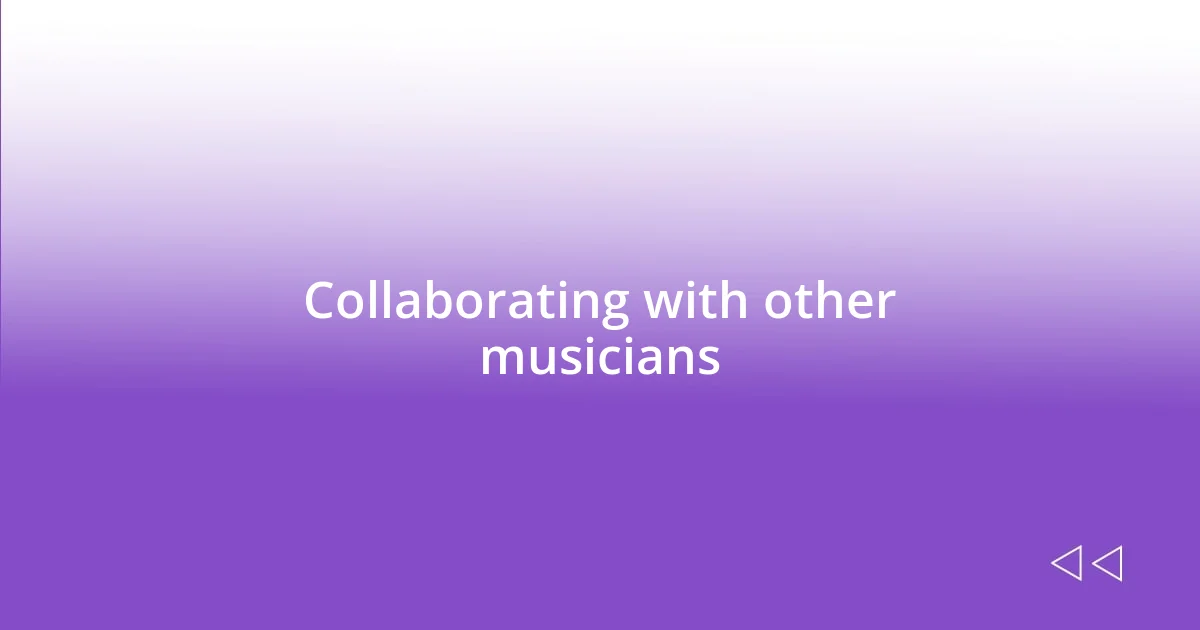
Collaborating with other musicians
Collaborating with other musicians is one of the most exhilarating aspects of my journey. I remember my first jam session with a local band; the energy in the room was electric. Mixing our different styles led to unexpected melodies that I couldn’t have crafted alone. Each musician brought their unique flavor, transforming the music into something truly special. This experience taught me that collaboration isn’t just about merging sounds—it’s about sharing perspectives and learning from one another.
When I work with other artists, I often find that our interactions spark fresh ideas and create a sense of community. It’s like a musical conversation where everyone contributes their voice. Here are some insights I’ve gathered from these experiences:
- Creativity Flourishes: Collaborations can break down creative blocks, allowing new ideas to emerge.
- Diversified Influences: Each musician brings distinct influences that can shape the overall sound.
- Skill Enhancement: Working together provides opportunities to learn new techniques and improve.
- Emotional Expression: Collaborating often brings out emotions in ways I might not explore solo, leading to deeper connections with the audience.
- Shared Goals: A common vision can guide everyone involved, pushing each participant to produce their best work.
In one memorable instance, I teamed up with a singer-songwriter who had a knack for storytelling. We wrote a song that blended my melodic sensibilities with her lyrical depth, resulting in a piece that resonated with listeners on multiple levels. Those moments of synergy remind me that collaborating isn’t just beneficial; it’s transformative. As I continue to evolve as a musician, I cherish these partnerships that fuel my growth and inspire my creativity.
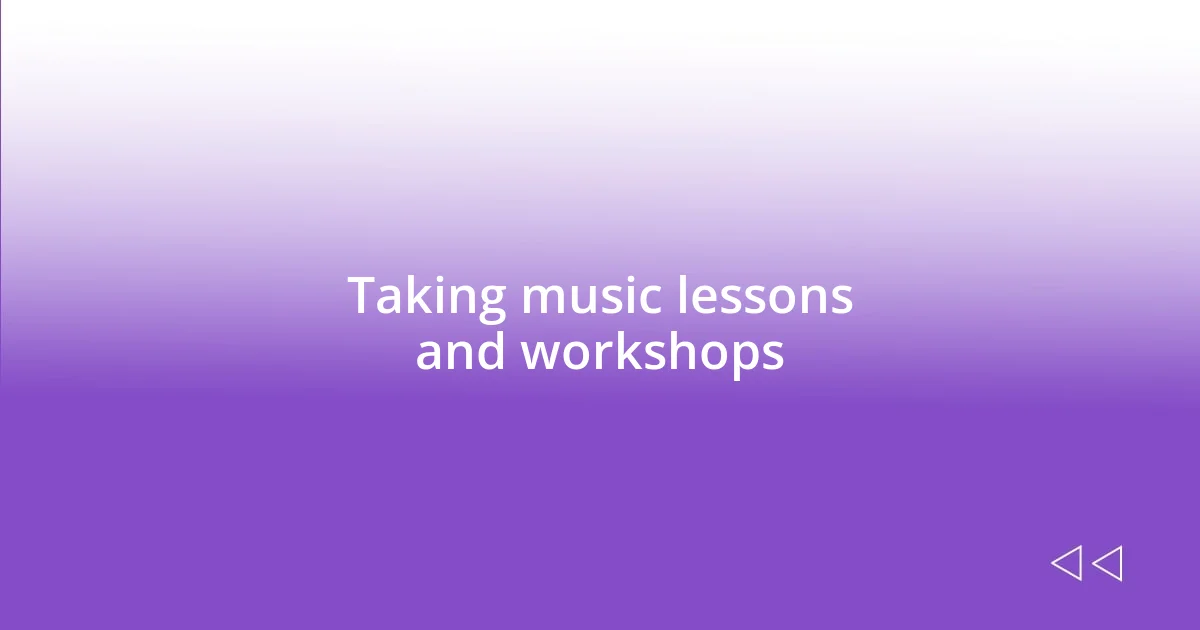
Taking music lessons and workshops
Taking music lessons and workshops has been a game changer for my evolution as a musician. I still remember the thrill of my first guitar masterclass. Surrounded by passionate players, I hung on every word as the instructor broke down techniques I’d only seen online. I learned that direct feedback offers insights you can’t get from YouTube tutorials. What surprised me was how much I enjoyed the camaraderie with fellow students, each of us pushing our boundaries together.
Workshops have also allowed me to explore specific areas of my craft more deeply. One workshop focused solely on songwriting, and I found myself digging into the emotional environments of my lyrics. I vividly recall writing a song about a bittersweet memory while surrounded by other aspiring songwriters, our stories woven together like a tapestry. That environment taught me the importance of vulnerability in music. It left me asking, “What stories am I holding back?”
I genuinely believe that learning from experienced musicians has expanded my skillset beyond my expectations. Every lesson feels like a golden opportunity to refine my techniques. Whether I’m exploring advanced music theory or experimenting with new instruments, these educational experiences continuously reshape my approach to music. What I often wonder is, how much more can I grow if I keep seeking out these learning opportunities? Each lesson proves that growth is a lifelong journey, one that I eagerly embrace.
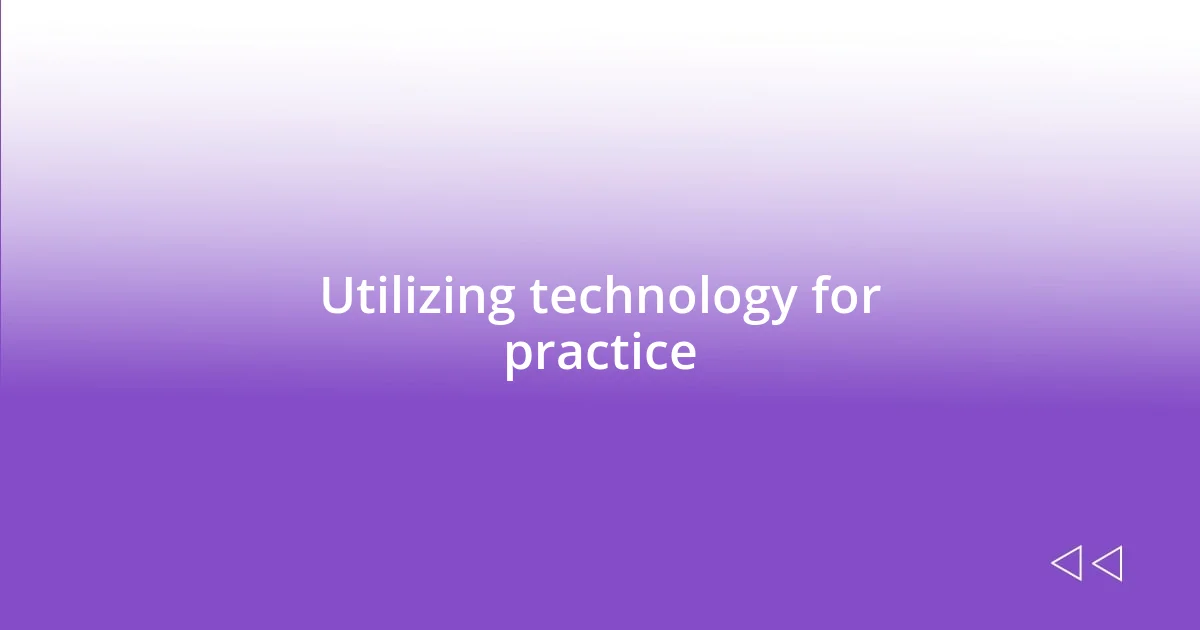
Utilizing technology for practice
Utilizing technology has truly transformed my practice routine. I’m constantly on the lookout for apps that help with music composition or help develop my skills. For instance, I started using a digital metronome during my practice sessions. It not only helps me keep time but also challenges me to push my tempo boundaries. I often find myself wondering, “How can I stretch my limits today?”
Recording software has also become an essential part of my practice. I remember the first time I recorded a practice session and listened back. Hearing my playing with fresh ears revealed habits I didn’t notice while I was in the moment. It was eye-opening! Now, I use these recordings to track my progress over time, and I can’t help but ask myself where I was six months ago compared to today. Each playback offers a glimpse into my growth and pushes me to stay mindful of areas needing improvement.
Beyond just recording, I’ve embraced online collaborative tools, which have connected me with musicians around the world. It’s incredible to jam with someone in another country in real-time. I remember a session with a ukulele player in Hawaii; we merged our styles and created a piece that felt both familiar and new. How did we manage to blend our different cultures? This fusion of perspectives not only fosters creativity but also keeps me inspired to explore new genres and techniques. With technology at my fingertips, the possibilities for musical evolution are endless!
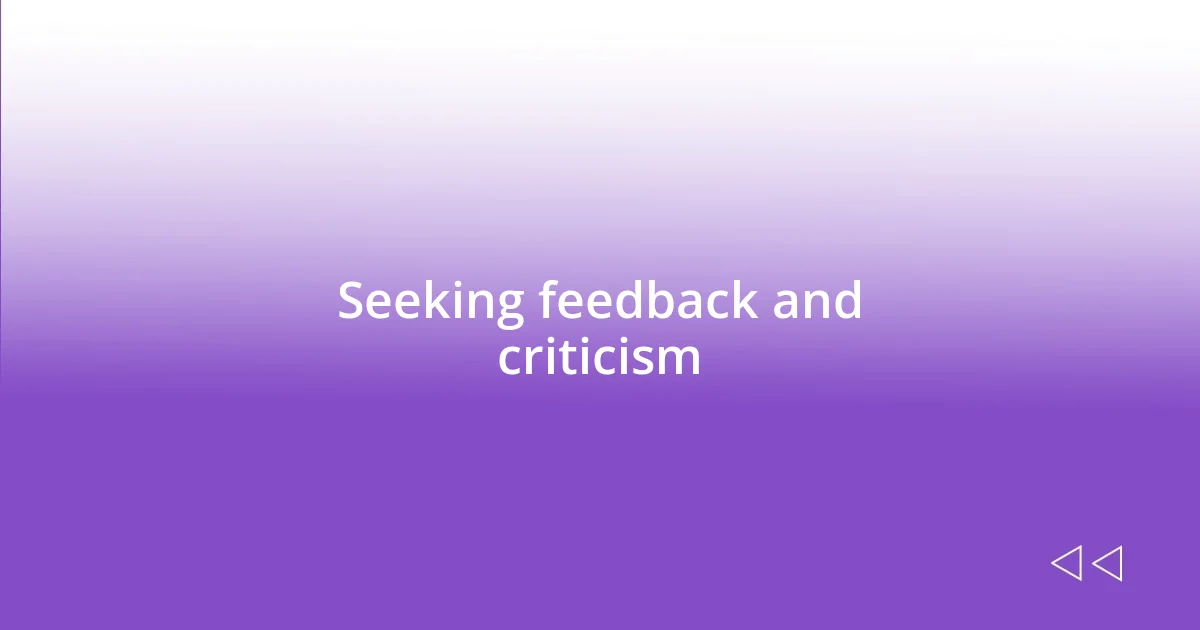
Seeking feedback and criticism
Seeking feedback and criticism has become an integral part of my musical journey. I vividly remember the first time I played at an open mic night. I was so nervous, but the supportive audience and constructive feedback that followed were priceless. Every comment—both positive and critical—helped me understand how others perceived my sound, and it made me rethink my approach. Isn’t it fascinating how a simple suggestion can spark creativity in ways you never expected?
I often reach out to fellow musicians for honest feedback on my compositions. There was a moment when a friend pointed out that a chorus in one of my songs felt repetitive. At first, I was defensive, but I realized he was right. I transformed that chorus, and the song became much stronger. This kind of criticism reminds me that collaboration isn’t just about sharing ideas; it’s about pushing each other toward excellence. How often do we let pride stand in the way of growth?
Embracing feedback has opened doors I never knew existed. After sharing my music online, some listeners offered insight into how my lyrics resonated with them on a personal level. That feedback ignited a deeper connection to my audience and inspired me to write more authentically. Feedback turns a solitary pursuit into a shared experience, and I find myself continually pondering: What can I learn from others to evolve as an artist? Each piece of criticism is an invitation to grow, one that I gladly accept.
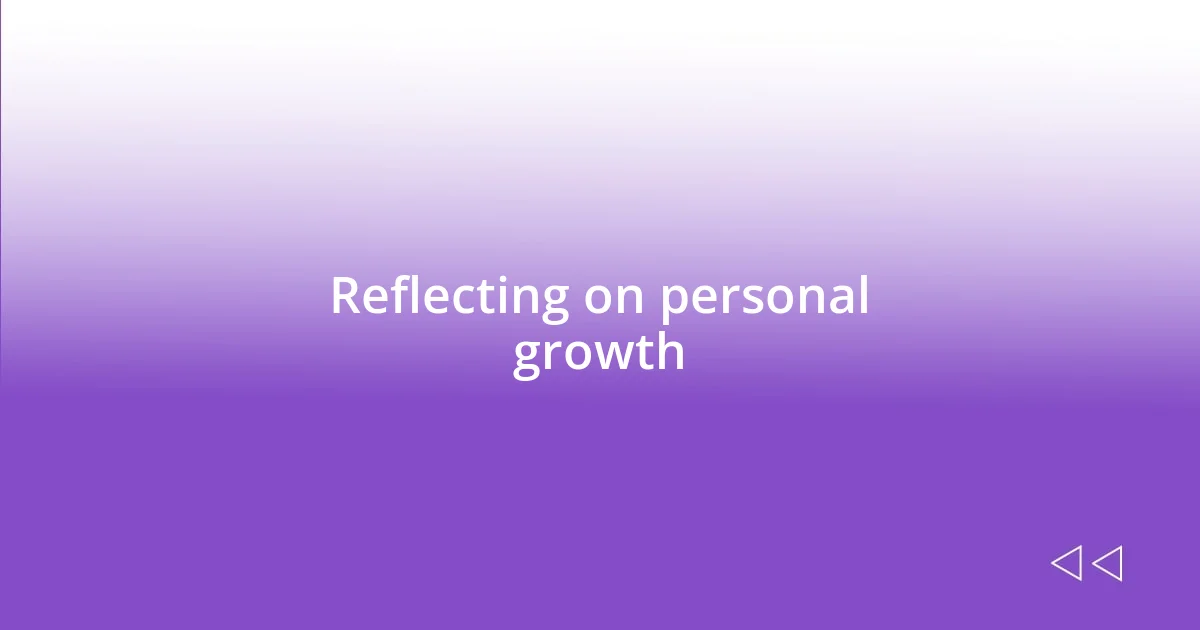
Reflecting on personal growth
Reflecting on personal growth often makes me pause and assess where I started versus where I am now. For example, I recall my early days of strumming chords on an old guitar, feeling frustrated when they didn’t sound like my favorite songs. Each struggle was a small stepping stone, and it makes me ponder: how did those little victories add up over time? Now, I can compose original pieces with confidence, driven by those past experiences.
It’s humbling to think about the musicians I admired. Their influence taught me valuable lessons about authenticity in music. I remember attending a workshop led by a local artist who shared their journey through failure and persistence. Hearing them discuss their low points resonated with me deeply; it made me realize that growth doesn’t just come from achievements but often from overcoming challenges. How often do we credit our most difficult moments for shaping who we are?
As I look back, I find that each performance, each interaction with my audience, has taught me something vital. A couple of years ago, during a small gig, I noticed a listener in tears during one of my songs. That moment struck a chord with me—seeing my music touch someone so profoundly reminded me of my purpose as a musician. It leads me to reflect: How can I more consistently create connections like that? Embracing these moments of reflection helps me stay grounded and focused on my path forward.

